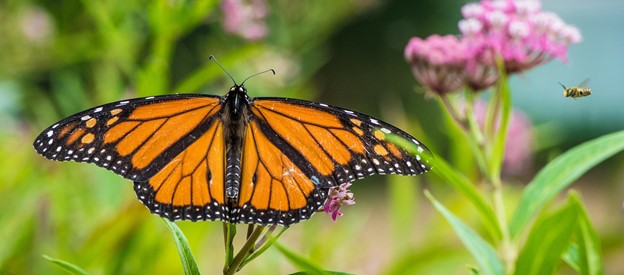
Pollinators are a necessary part of our ecosystem. Pollinators are responsible for fertilizing many of our food crops. Without them, many food crops would no longer exist.
A pollinator is a bee, moth, butterfly or other insect, a bird, a bat or other animal that moves pollen from the male anthers to the female stigma of flowering plants. Throughout the United States there are hundreds of species of native bees and butterflies, and thousands of species of moths that serve as pollinators. The wind can also serve as a pollinator. Once pollinated, the plant can produce fruits, vegetables and seeds.
In the United States, managed honeybee colonies have experienced significant losses of bees. Other pollinators are also in decline. The exact causes have not been identified, but many causes are suspected. They include:
• Loss of diversity of flowering plants
• Loss of native habitat due to expanding urban areas and monoculture farming of soybeans and corn
• Widespread use of pesticides that also kill beneficial insects such as pollinators
• Climate change and changing weather patterns
• Disease and parasites
You can help by:
• Planting a variety of native plants in your yard and garden
• Reducing the use of pesticides on your lawn
• Following application guidelines for the pesticide and treating only when necessary
• Planting an organic lawn that does not use artificial fertilizers and pesticides
• Purchasing organically grown foods that are produced without the use of pesticides and artificial fertilizers
Consider joining our Pollinator Protectors team:
We plant gardens, fight for pollinator health and oppose the toxins that harm these vital creatures, sharing strategies across states.
We are dedicated to fighting for pollinator health and against the toxins that harm bees, moths, butterflies and other creatures-- so essential to life on this planet. A subteam of the Grassroots Network's Food & Agriculture Team, we participate in national strategy and are a forum for sharing and learning about state and local tactics in education and action for pollinators.
Local groups are allying with schools and other local institutions in planting pollinator gardens as a key mode of community education about the essential role pollinators play in a healthy planet and food production. State chapters are fighting for habitat on public lands, and frequently for state-level bans against harmful pesticides like neonicotonoids that have been banned abroad.
We share tactics in bimonthly meetings and on our listserv (subscribe here). We support the creation of national Sierra Club positions as part of the national Food and Agriculture Team's Federal Policy Subteam.
Take action to help save our bees and the planet!
Help Save Our Bees and the Planet!
Get Congress to pass critical protections for pollinators.